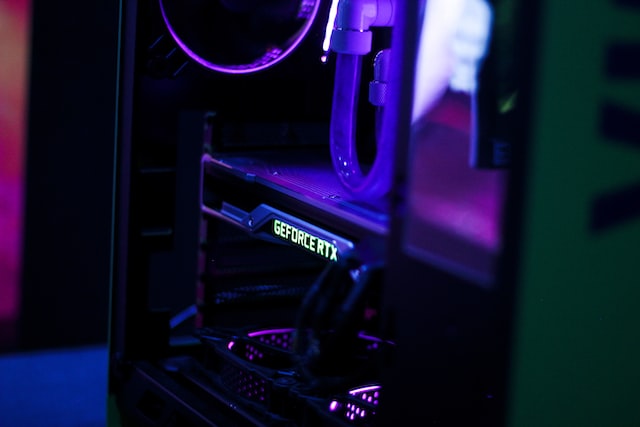When you’re building or buying a gaming PC, the graphics processing unit (GPU) is one of the most important components to consider. It can be the difference between a system that can handle the games you want to play and one that can’t. With so many options on the market, it can be tough to decide which GPU is right for you. But don’t worry—we’re here to help. In this blog post, we’ll walk you through everything you need to know about choosing a GPU for your gaming PC, including what to look for in terms of specs and performance.
What is a GPU?
A GPU is a Graphics Processing Unit – a chip on a computer’s motherboard that is responsible for rendering images, animations and videos. Gaming PCs need a good GPU to run the latest games smoothly.
There are two main types of GPUs: discrete and integrated. A discrete GPU is a separate card that plugs into the motherboard and has its own power supply. An integrated GPU is built into the CPU and shares memory with the CPU.
Discrete GPUs are generally more powerful than integrated GPUs, but they also require more power and generate more heat. Integrated GPUs are less powerful but use less power and generate less heat.
When choosing a GPU for gaming, it’s important to consider what type of games you want to play and how much money you’re willing to spend. If you’re only interested in playing older or less demanding games, an integrated GPU may be all you need. But if you want to play the latest AAA games at high settings, you’ll need a powerful discrete GPU.
What are the different types of GPUs?
There are four types of GPUs: integrated, discrete, hybrid, and virtual.
Integrated GPUs are built into the CPU and share memory with it. They are usually less powerful than discrete GPUs and are best for budget PCs or laptops.
Discrete GPUs have their own dedicated memory and are more powerful than integrated GPUs. They are best for gaming PCs or laptops.
Hybrid GPUs combine an integrated GPU with a discrete GPU. They offer better performance than integrated GPUs but not as much as discrete GPUs.
Virtual GPUs are created by software and can be used by multiple users simultaneously. They are typically used in cloud computing or remote desktop applications.
What factors should you consider when choosing a GPU for your gaming PC?
There are a few key factors you should consider when choosing a GPU for your gaming PC, including the type of games you want to play, the resolution you want to play them at, and the level of detail you want.
The type of games you want to play will dictate what kind of GPU you need. For example, if you’re only interested in playing basic 2D games, then you won’t need a high-end 3D card. Conversely, if you’re planning on playing the latest and greatest 3D games, then you’ll need a top-of-the-line card that can handle those kinds of graphics.
The resolution you want to play at is also important. If all you care about is getting the most frames per second (FPS), then resolutions like 720p or 1080p will be just fine. However, if you’re someone who likes to see things in 4K or even 8K resolution, then you’ll need a much more powerful GPU that can handle those higher resolutions.
Finally, the level of detail is something else to consider. If all you care about is getting the game to run without any hiccups, then lower detail settings will be just fine. However, if you’re someone who wants every last bit of graphical fidelity out of their games, then you’ll need a card that can handle higher detail settings without breaking a sweat.
The best GPUs for gaming PCs
Selecting a gaming GPU is a very important decision for any PC gamer. The graphics processing unit (GPU) is responsible for rendering the image you see on your monitor, and therefore has a large impact on gaming performance. Here are some things to consider when choosing a GPU for your gaming PC:
1. Graphics quality: The higher the graphics quality, the better the image will look. However, this comes at a cost of increased system requirements, so be sure your other components can keep up.
2. Frame rate: A higher frame rate means smoother gameplay and faster reactions to in-game events. If you’re looking for competitive advantage, aim for a GPU that can provide high frame rates.
3. Resolution: The resolution of your monitor will dictate how much detail you can see in-game. Higher resolutions require more powerful GPUs to run smoothly.
4. Budget: Ultimately, your budget will be the deciding factor in which GPU you choose. Be realistic about what you can afford, and don’t skimp on other important components just to save a few dollars on the GPU.
5. Future proofing: It’s always worth considering future-proofing your build by choosing a slightly more powerful GPU than you need right now. This will ensure that your system can handle any new games or software releases in the future without issue.
Conclusion
There are many factors to consider when choosing a GPU for your gaming PC, but the most important thing is to find one that fits your budget and meets your needs. If you’re looking for the best possible performance, then you’ll want to spend more money on a high-end GPU. However, if you’re just looking for something that will get the job done, then a mid-range or even low-end GPU may be a better option. Whichever route you choose, make sure to do your research so that you end up with aGPU that will give you the gaming experience you’re after.
